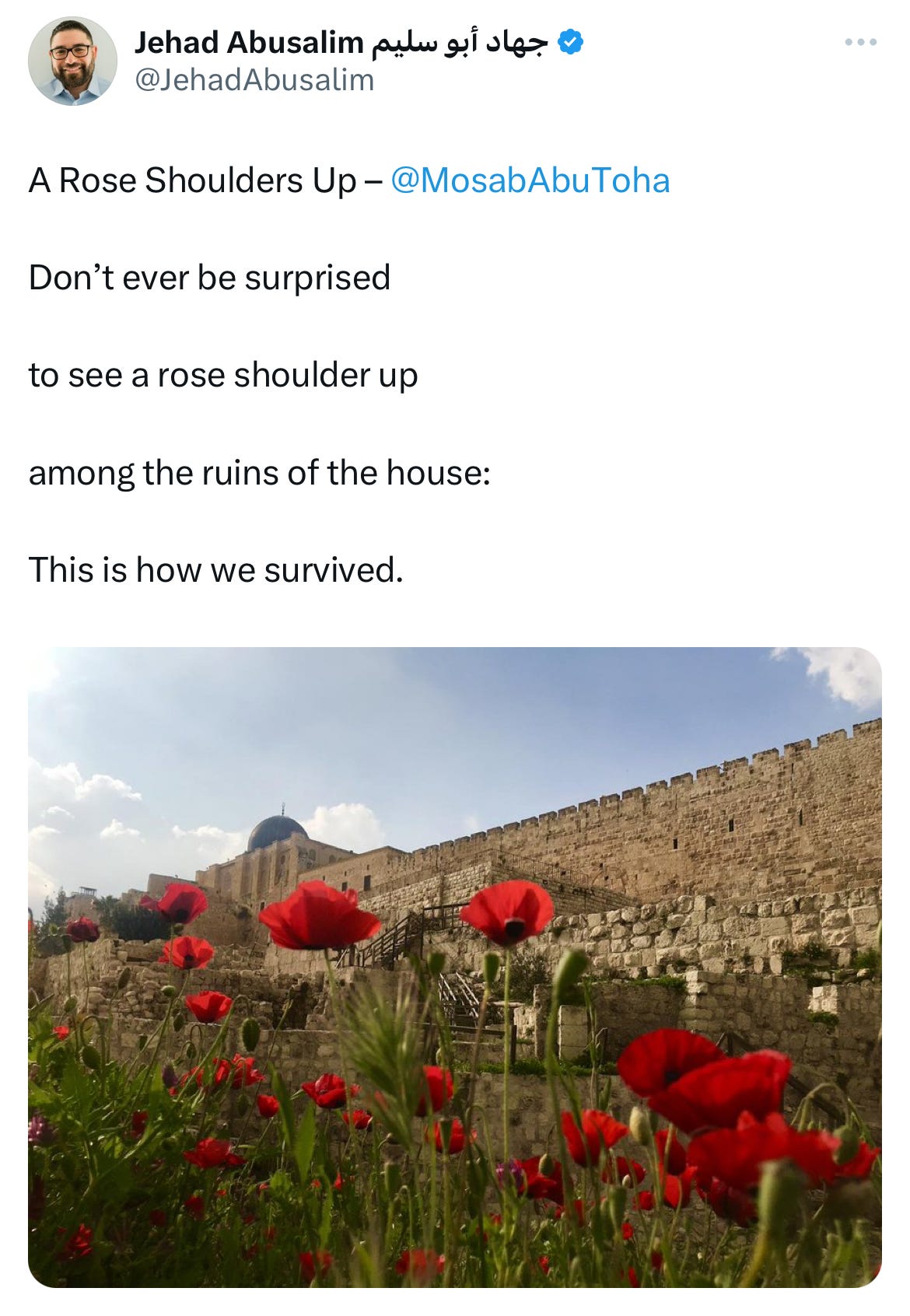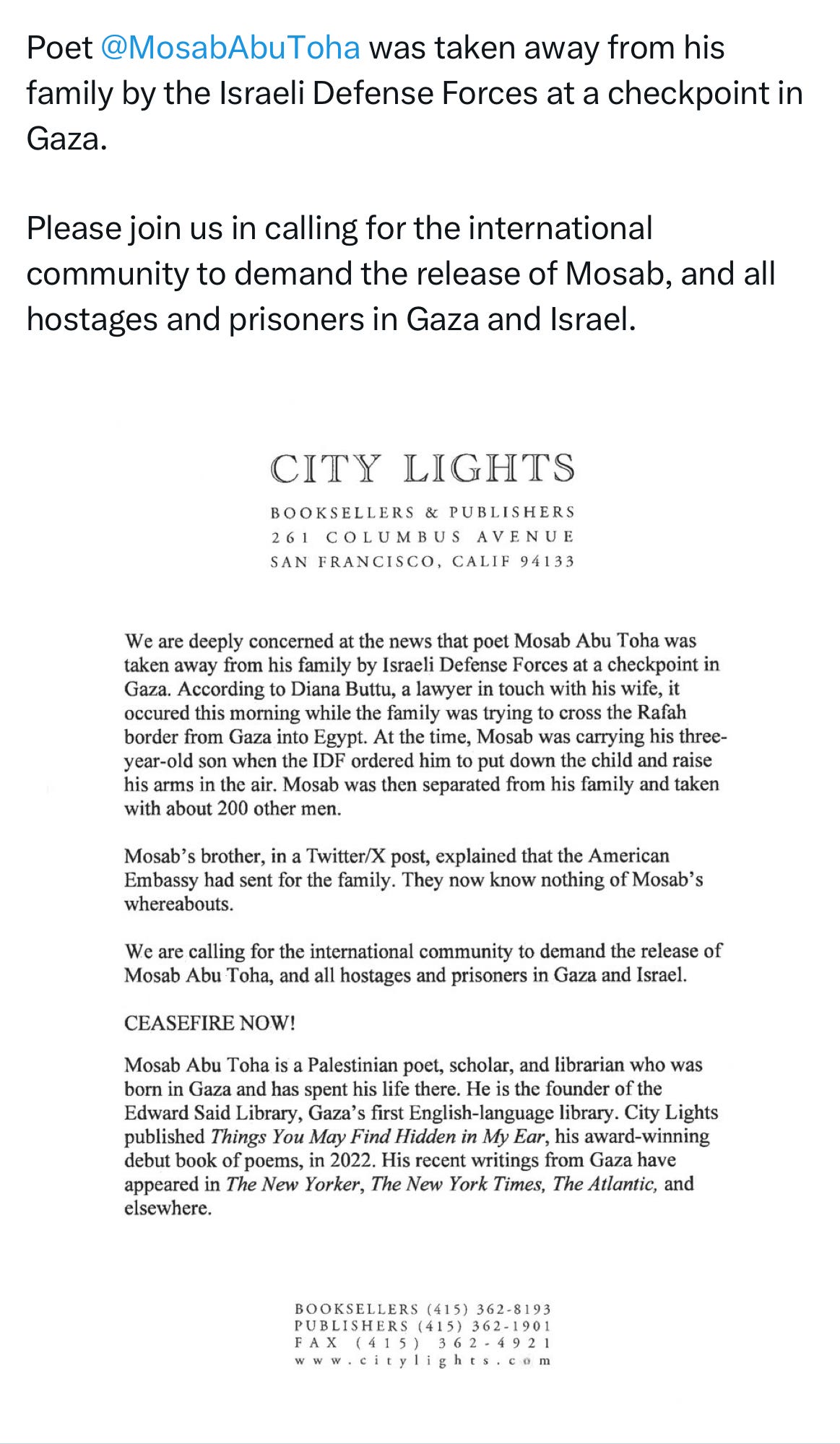UPDATE: I learned yesterday Mosab Abu Toha has been released due to the incredible amount of pressure both in Palestine and the United States. He was released for medical treatment after being beaten and interrogated. I’m so incredibly grateful for his release, and still demand all the other Palestinians held without charge to be released as well. Keep pressuring your elected representatives for a permanent ceasefire.
I decided to include the new information in my original post instead of writing a new one.
This morning I learned Mosab Abu Toha was kidnapped by the Israel Defense Forces while fleeing farther south. What I know is while they were traveling to Rafah, Mosab was taken from his family:
I want to spend the majority of this time sharing poems, interviews, and updates from/about Mosab Abu Toha that I didn’t include in my previous post:
Gazan Family Letters, 2092 - Mosab Abu Toha
I’m sorry I couldn’t send a letter for yesterday. I had trouble finding paper to write on, and I later realized my seven-year-old son had used up all of it. He had a dream the other day and tried a bunch of times to draw what he saw. He said it was a castle on the Mediterranean, but there was no water in the sea. A Coleridge of our bleak time.
Palestinian Painter - Mosab Abu Toha
Two birds
leave their nest,
singing a song, perhaps
for the artist working
in what used to be
a well-kept old garden.
What a Gazan Should Do During an Israeli Air Strike - Mosab Abu Toha
…and if you are a farmer, you should put some strawberry seeds / in one pocket / and some soil from / the balcony flowerpot in the other / and hold on tight / to whatever number there was / on the cake / from the last birthday.
Silenced Verses: On the Kidnapping of Mosab Abu Toha - Jehad Abusalim
The last 44 days have shown Israel’s aggression, destruction, and bloodshed, revealing that this war is not just against a specific Palestinian faction or group. It represents a war of annihilation and genocide, a war of erasure. Israeli officials have referred to it as a second Nakba.
-
One may wonder why Israel would kidnap a poet. The answer, though painful, is simple. In its genocidal war against Palestinians, Israel seeks to erase not only Palestinian lives but also their culture and heritage. From shelling the Great Omari Mosque’s minaret to bombing Gaza’s universities, libraries, historic homes, and ancient churches, targeting a poet, a journalist, or an artist is part of this genocidal war against an impoverished population.
Younger Than War - Mosab Abu Toha
Now my youngest child, born in America in May 2021, is living through the third wave of Israeli bombing. Not only are he and his older brother and sister smelling death around them; but they have also lost their house in Beit Lahia 10 days ago. Luckily no one was at home. My son Yazzan, who is 8 years old, asks me, “Are our toys still alive?”
— Mosab Abu Toha
From ‘Younger Than War’:
Loaves of bread went stale.
I was still 7 at the time.
I was decades younger than war,
a few years older than bombs.
Obit - Mosab Abu Toha
my shadow that no one’s attending to,
bleeding black blood
through its memory
now, and forever.
The Agony of Waiting For a Ceasefire That Never Comes - Mosab Abu Toha
I lost not only my house and its rooms but also my new clothes and shoes and watches. My books, too.
I remember how slowly I built my personal library, and how long it took for friends to mail books to Gaza. When I came back from the U.S. in February, 2021, I stuffed a hundred and twenty books into my family’s suitcases; I had to discard some of my shoes and clothes to make space. When I came back in May, 2023, I carried an extra suitcase for about seventy books. Some were signed by friends—Katha Pollitt, Stephen Greenblatt, Richard Hoffman, Ammiel Alcalay, Jonathan Dee. The airport officer thought that my passport was expired because he read it backward, from left to right. On the journey from Cairo, I sprained my shoulder while carrying my heavy suitcases.
Less than two months ago, I was in Philadelphia for a literary festival, and was planning to visit San Francisco. But I had a feeling that the situation in Gaza was precarious, and I decided to shorten my trip. Before I flew home, I asked my friend Hasan to drive down from Syracuse, so that he could give me thirty-five books that I had left with him. They included the five heavy volumes of “The Greenwood Encyclopedia of American Poets and Poetry.”
-
Now I sit in my temporary house in the Jabalia camp, waiting for a ceasefire. I feel like I am in a cage. I’m being killed every day with my people. The only two things I can do are panic and breathe. There is no hope here.
-
If not for the war, I would be playing soccer with my friends twice a week. I would be watching movies with my wife. I would be reading the books on my shelves. I would be taking my kids to the playground, and to the beach. I would be riding my bike with my son, Yazzan, on the beach road. But now there are no books and no shelves and no beach road.
A Conversation with Derek Walcott Prize-Winning Poet Mosab Abu Toha - Jean Franco
Also as Palestinian refugees, poetry has always been something very important – to speak about our misery and the occupation.
-
Through poetry I think I am more open to talking about my past, present, and my future – these three are very glued together for me.
-
In some of my poems, I try to explore what these people’s lives looked like before they ended. I’m trying to zoom into details that are not captured by a journalistic camera.
-
It’s about more than just our lives: it’s also about nature, it’s about the sun…
-
My role as a poet is to put myself in the place of those who have died. I myself have been in this place: I have been in Gaza all my life, I have lost several friends, I have been injured – shrapnel was lodged less than two centimeters from my windpipe. What was it like for the people who were crushed beneath the rubble of the house they loved? Maybe one of the walls on which they had stuck photos of their favorite singers and football players was the same wall that killed them. We don’t know what happened to those who were killed. It is my duty to create this life for them, to imagine what it is like to be in their place.
-
Attention to nature has always been one of the most exciting things for me. The beauty that you watch only happens once in your lifetime. It is the same with a child: every day he grows up he is never the same.
-
The challenge is to foster in our children and grandchildren the feeling that they have something to return to. As a kid, when I used to introduce myself I used to say: “Hi, my name is Mosab, I am from Jaffa.” It’s very important to remember where we come from, not only our names and our date of birth.
Ceasefire Cento - Mosab Abu Toha
They didn’t find a place to bury you.
They carried you on their shoulders,
The houses never saw you.
They’ve already packed their bags.
Mosab Abu Toha, Oct 17, 2023
From ‘Ceasefire Cento’
We all long to write the poem that will stop this death.
-
Could anyone have wanted it that way?
Who could have wanted it that way?
Look in the mirror.
-
And my dream for the children of Palestine
is that they are free
to run and laugh in the streets, bathed in love.
-
The children (young, old, ancestral, in us)
need peace to survive and thrive
We will try again,
despite our losses, despite the risk
that it will leave us unrecognizable
-
I could never
get to the end of my singing to you
of what I love
-
name and repair this torn fabric
name and repair this living grief
-
And the wind has enfolded you—
how the wilderness prays for you
-
“Daughter”, Gaza called. “Come!”
The door swung open.
-
-
My Thoughts:
I am devastated. I am angry. Again and again. May the song of ones body be heard. The grief. The rage. The wails.
May the songs be heard of Palestinians held in detention.
I desire disruption. For one’s pain to be carried by wind. By rain. For time to undo itself. For gravity to forsake. For voices. The sound of its utter. Its lilt to be carried across oceans. For the bullets. The shrapnel to forsake their forward motion.
I ask for the impossible. To be possible. To imagine what others find unimaginable. May we find the progression of time undone.
To trace the walls. The rooms of ourselves and find the suffering heavy, Holding it all. Together. Walking through. Door to door. Time to time.
To feel the edges of us.
The edge is close. It surrounds and enraptures. It leads me toward air. Toward breath. Toward memory. It reminds me of wholeness. I am leaping from myself to myself. I’m submersible. Gathering. My childhoods. My nows. My nevers.
Devastations. Disruptions. Rages.
To leap again and again. To hold the suffering. Time to time. To hear the songs. Ongoing. Steadfast. Gathering.
-
I leap because, what is there for me to land on?
What possibilities can be created here.
To enter a new beginning and find all of us whole, eternal.
-
The prisons, jails, and detention centers in Israel connects to those in the U.S.
May we see a world where prisons no longer exist. Someone imagined and created a world with them, and we can keep imagining and creating a world without them.
-
I write all this to envision what’s possible here and now, where we walk through each second of our lives whole because we did everything we could to fight for liberation.
To hold the suffering and what comes after.
Where Mosab is free, and all Palestinians are free.
-
I hope you keep writing and calling your reps to demand a ceasefire.
A ceasefire is just one step towards a free Palestine.




